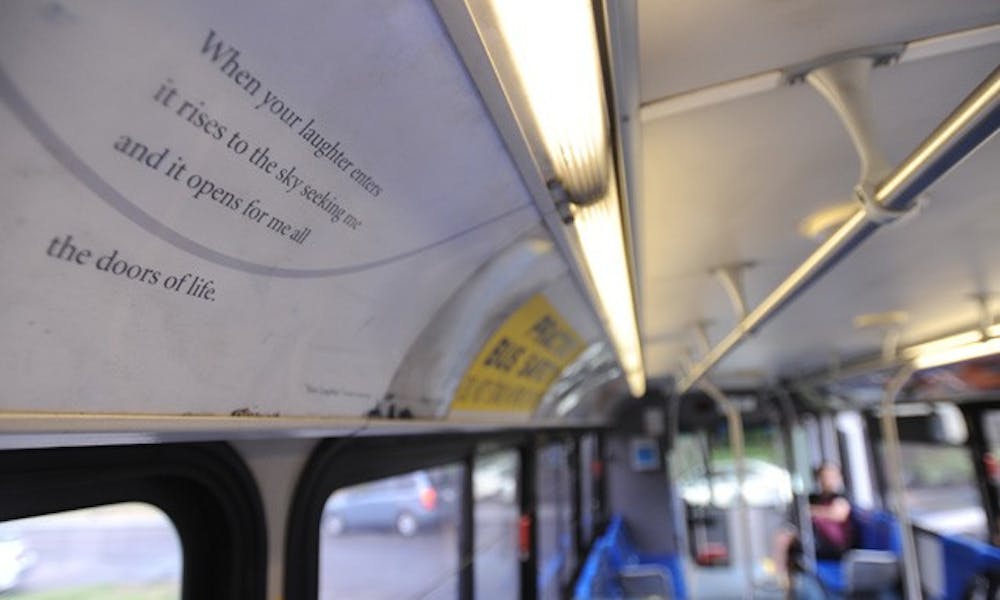Frustrating rides, tight spaces and awkward jarring are probably the most interesting things associated with Duke buses, but Professor of English Deborah Pope and Arts Outreach and Commmunications Assistant Beverly Meek are trying to change that. When you ride a Duke bus, they want you to have an experience with poetry.
Pope is passionate about the artistically written word. In both her professional and daily life, she wants people to realize that poetry isn’t just something for English majors, stuffy libraries and coffeehouses.
“I don’t believe poetry is a static form,” Pope said. “I believe in poetry getting off the page, out of the classroom and into the world. I thought that putting the poetry on the buses was a common denominator.”
To fulfill her aspiration of making poetry more accessible, she paired with Meek, who provided the funding and practical know-how to get the project off the ground.
“I’ve had placards put on the bus before. The readability is an issue,” Meek said. “We dealt with text, font size and how it related to the poetry, and then some design aspect, making sure it was something people were going to read.”
With the green light from Meek, Pope asked her students to find short excerpts from recognized poems to be printed and placed on the buses.
Pope and Meek worked with designer Jan Martell to create a unique aesthetic for all of the works. They wanted the design to work with the words to create something beautiful and touching. The final prints are all very simple, zen and elegant, highlighting the character of each poem.
“Each design evokes a quality of the poem,” Pope said.
When everything was finished, Pope chose 25 different excerpts to go in 25 different buses. It would seem Duke now has its very own fleet of moving art, and the poems have been placed on every bus in the Duke system, not just those used by students. Meek was ecstatic that the project would help bridge the gap between the student population and the medical center.
“As for the buses that serve the med center, this is a place where the larger Duke community could come in as well,” Meek said. “We all can be here with these words. They don’t separate us in any way. It’s one place where anyone can participate.”
Pope agreed the project should go beyond just undergraduates.
“It’s an open conversation, it’s not something that’s just campus specific.... The way poetry itself should speak to a wide spectrum of individuals,” she said.
For Pope, the point of this project was to make poetry something vibrant, and something that could be relevant in the lives of people today.
“I wanted to show that poetry is not ponderous all the time, you don’t need footnotes or an intermediary,” Pope said. “I wanted people to be able to respond without someone there telling you how to respond.”
Based on the final poem selections, Pope’s students responded to an interesting mix of themes. The chosen pieces cover a wide range of topics, localities and times.
“The poets range from an eigth century mystic to Langston Hughes,” Pope said. “They represent just about every continent... Some are funny; some make you think a little more,” Pope said.
One of Pope’s students, senior Salman Bhai, sought out work of the latter variety.
“I tried to find poems that would help students gain insight,” Bhai said. “I found lots of poems by Rumi. It gives people the eight minutes it takes to get from East to West to reflect on their lives.”
This reflection is something that Pope wanted Duke students to be able to experience through poetry. The project has certainly started to get noticed.
Freshman Sarah Van Name was particularly pleased by the attention the project gives to writing on campus.
“I feel like creative writing as an art at Duke is sometimes pushed to the side, and the poetry on the bus made me so happy because it was creative writing in such a prominent place,” Van Name said.
This visibility was one of the reasons Pope chose buses as her medium.
“It’s public yet intimate. I like that it’s public and you can sit there and have your private thought about it,” Pope said.
Pope and Meek have already started planning ways to improve and evolve their new program. They’re thinking about rotating the poems between different routes so that everyone would have the opportunity to experience all 25 pieces.
There is also discussion about having student poetry featured, which would give a public creative outlet for student poets on campus, but such a move would likely be a later addition to the program.
When asked about the end goal of the venture, Meek and Pope gave straightforward replies.
Meek wants to foster student discussion, while Pope wants “to show that poetry is not remote and arcane, it’s immediate, and both ordinary and transforming.”
Get The Chronicle straight to your inbox
Signup for our weekly newsletter. Cancel at any time.

